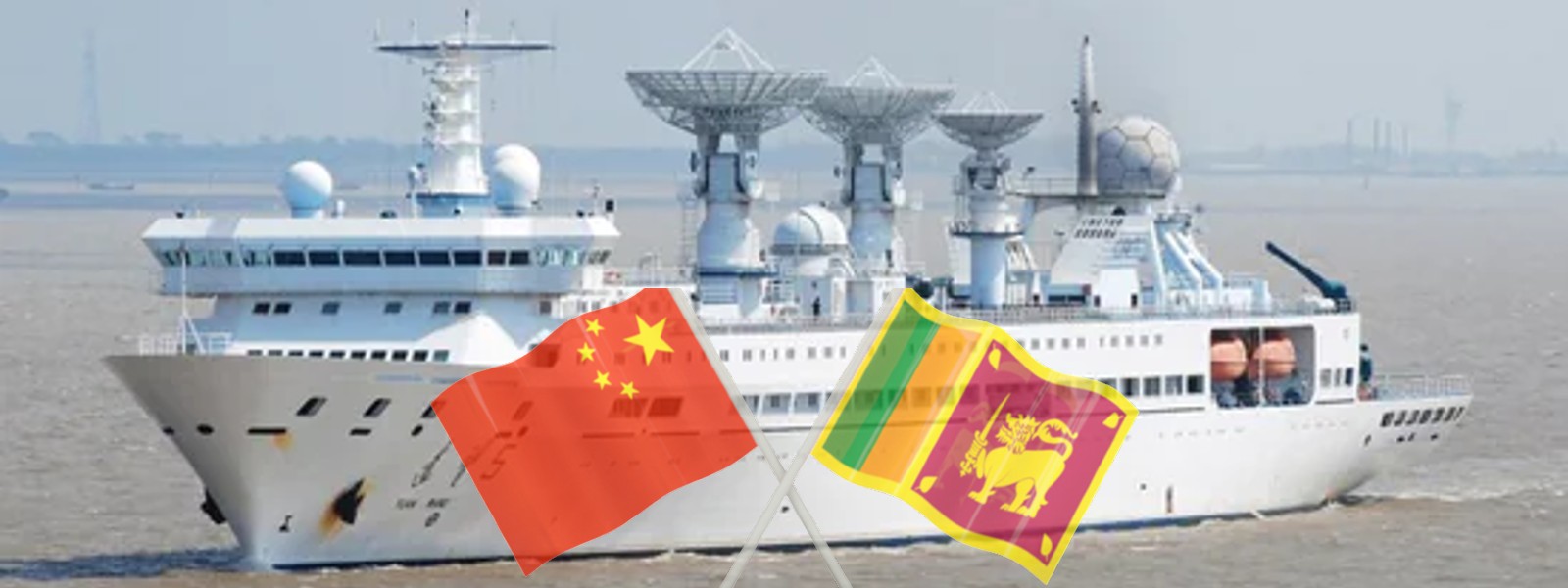Sri Lanka’s efforts to improve trade and conclude the planned Free Trade Agreement (FTA) with China along with the debt restructuring programme with the Chinese have been put at risk by the diplomatic dispute over the controversy surrounding the visit of the Yuan Wang 5 satellite tracking vessel to Sri Lanka, The Sunday Morning learns.
This, despite reports that Sri Lanka has granted permission for the vessel to call at the Hambantota Port on Tuesday (16) for a seven-day replenishment stop. The Government on 5 August rescinded permission for the vessel to dock in Sri Lanka by asking the Chinese to defer the arrival, which was earlier scheduled for Thursday (11), pending further consultations.
According to the Ministry of Foreign Affairs, the permission to call at Hambantota on Tuesday (16) was communicated to the Chinese Embassy in Colombo on Friday (12).
Sri Lanka had earlier rescinded permission granted in July following strong diplomatic pressure from India and the US. It is learnt that both India and US had not furnished the Government with solid reasons for their concern and objection to the vessel docking in Sri Lanka despite a request from both parties to do so.
The Chinese meanwhile expressed their displeasure and continued to request the Sri Lankan Government for a date the Chinese vessel could dock in Sri Lanka for replenishment since it had not called at any other port since its departure from China.
However, the Indian Foreign Ministry later rejected allegations that India had exerted pressure on Sri Lanka regarding the issue.
Meanwhile, the Sri Lanka Ministry of Foreign Affairs in a press release issued yesterday stated that the Yuan Wang 5 had been granted permission to replenish at the Hambantota Port on 16 August.
The Ministry stated that on 12 August, the Chinese Embassy had informed the Ministry via Diplomatic Note that the Yuan Wang 5 was scheduled to arrive in the Port of Hambantota on 16 August and had applied for clearance for replenishment purposes for the new dates 16 to 22 August.
It added that having considered all material in place, the clearance to the Embassy of the People’s Republic of China was conveyed for the deferred arrival of the vessel from 16-22 August.
A senior Foreign Ministry official, speaking on terms of anonymity, told The Sunday Morning that the way in which Sri Lanka had handled the Yuan Wang 5 vessel’s visit had been disastrous, with the impact of the decision taken in Colombo negatively affecting Sri Lankan efforts to promote the country as a tourism destination in China and encourage Foreign Direct Investment (FDI) into the island.
“This matter was badly handled and poorly communicated. Sri Lanka also should stand for its policies. If Hambantota is a commercial port and we allow warships and commercial vessels from all over the world to come there for replenishment, we need to be consistent about it,” the Foreign Ministry official said.
When asked if Colombo’s actions would impact Sri Lankan interests in China, the official said: “Yes, because over in China, if you upset the Government, everyone falls in line. This happens in other countries too, but more so in China.”
According to the official, the Chinese space programme is very close to the Chinese public and closely linked to the national pride of the Chinese nation.
“Sri Lanka is viewed as a friend and China doesn’t have many ‘friends,’ so when Sri Lanka grants permission for a ship that is a critical part of the Chinese space programme and then suddenly cancels the permission due to concerns by regional countries – some that China sees as rivals – it sparks distrust and impacts relations between both countries,” the official said.
Sri Lanka had planned to conduct several tourism promotion projects in China ahead of the tourist season and the Chinese holidays to boost tourist arrivals into the island.
Sri Lanka is also in the early stages of conducting negotiations with China on restructuring debt, which is vital to the country’s economic recovery, especially in reaching an agreement with the International Monetary Fund (IMF).


